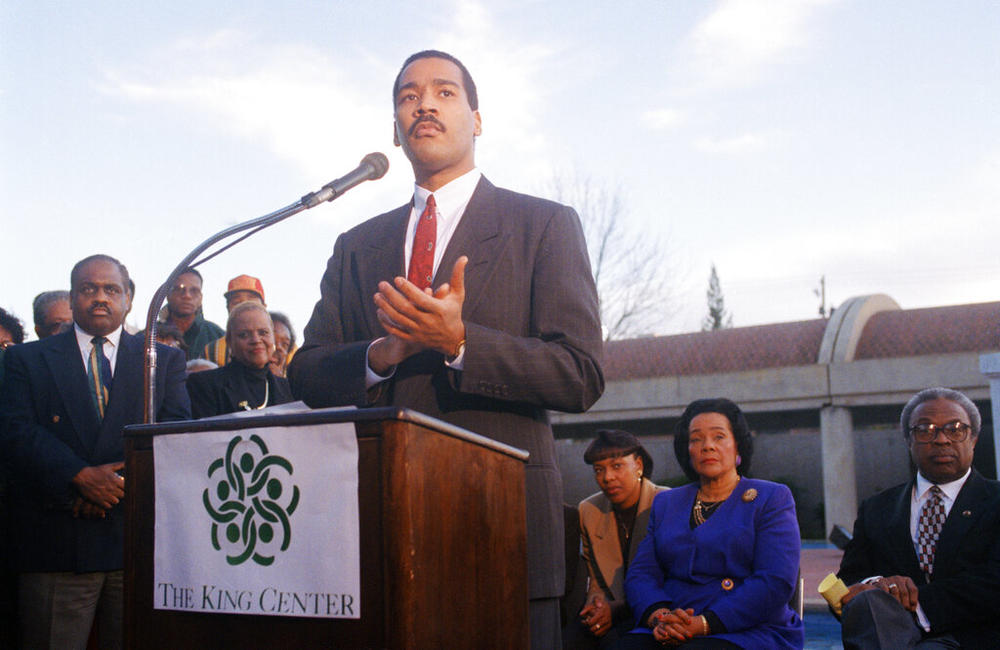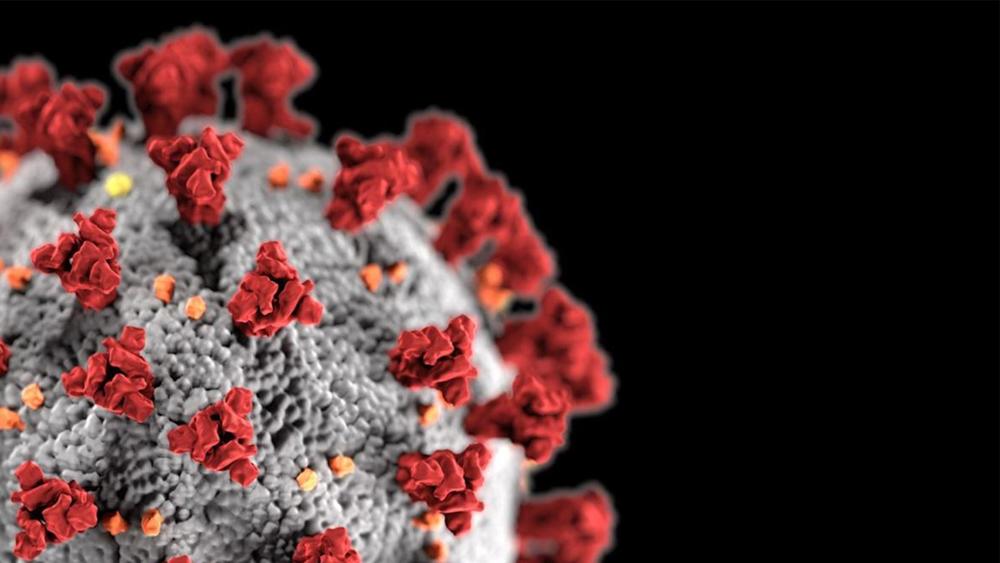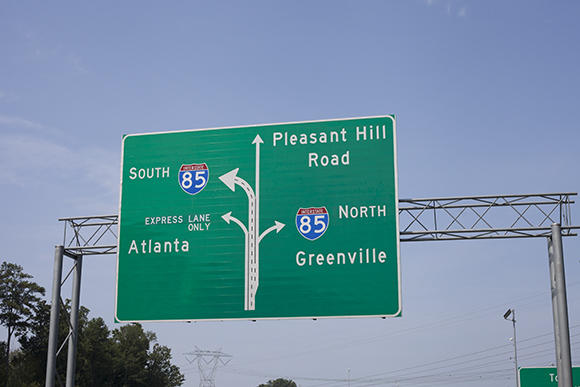
Section Branding
Header Content
Georgia Today: Roe v. Wade anniversary; Antiviral COVID-19 treatments; Traffic death increase
Primary Content
LISTEN: On the Monday, Jan. 22 edition of Georgia Today: On the anniversary of the Roe v. Wade decision, we look at how abortion access has changed; patients groups are pressing for easier access to anti-viral treatments for COVID-19; and despite more safety features in cars, traffic deaths are spiking. We'll talk about why.

Peter Biello: Welcome to the Georgia Today podcast from GPB news. Today is Monday, Jan. 22. I'm Peter Biello. On today's episode on the anniversary of the Roe v. Wade decision, we look at how abortion access has changed. Patient groups are pressing for easier access to antiviral treatments for COVID-19, and despite more safety features in cars, traffic deaths are spiking. We'll talk about why. These stories and more are coming up on this edition of Georgia Today.

Story 1:
Peter Biello: Dexter Scott King, the youngest son and third child of Martin Luther King Jr. and Coretta Scott King, has died. The King Center says Dexter King died today in Malibu, Calif., after a battle with prostate cancer. He was chairman of the King Center and oversaw the King family's protection of his father's intellectual property. He also pursued a career in media and entertainment, starring in productions centered on the civil rights movement. He was named for Dexter Avenue Baptist Church in Alabama, where his father once served as pastor, and he was just 7 years old when his father was assassinated in 1968. Dexter Scott King was 62 years old.

Story 2:
Peter Biello: Today is the 51st anniversary of the Supreme Court's Roe v. Wade decision, which provided constitutional protection for abortion. The court overturned that decision more than a year ago. GPB 's Sofi Gratas has more on how the landscape has changed for people seeking abortions in Georgia.
Sofi Gratas: The Life Act, passed on the heels of the reversal of Roe v. Wade, makes abortions in Georgia illegal past six weeks of pregnancy, with certain exceptions. But many Georgia physicians, like Dr. Didi Saint Louis with the Committee to Protect Health Care, say it's not so simple.
Dr. Didi Saint Louis: You have women coming in where pregnancies are not even on the cusp of viability, but because there's a heartbeat, we're just waiting to see how sick can this person get, because the physicians are afraid. The health care administrators are afraid. We find ourselves with our hands tied behind our back.
Sofi Gratas: Because Georgia's law bans procedures if any so-called fetal heartbeat is detected. After ongoing litigation over the law's legality, the Life Act was sent back to a lower court late last year. For GPB News, I'm Sofi Gratas.
Story 3:
Peter Biello: A state judge in Cobb County, has ordered records to be made public in the divorce involving a special prosecutor hired in Georgia's election interference case against former President Donald Trump and others. The special prosecutor, Nathan Wade, is accused of having an affair with Fulton County District Attorney Fani Willis. The judge today ordered the records unsealed, but put off a decision on whether Willis will have to sit for questioning in the divorce case. Willis has accused Wade's estranged wife of trying to derail the case against Trump and others by seeking to question her. A defendant in the case, Mike Roman, alleges the affair creates a conflict of interest, requiring disqualification.

Story 4:
Peter Biello: Patient groups want antiviral treatments more available to Georgians at risk from COVID-19. More than 20 organizations signed a letter to the governor and insurance commissioner, urging they make it available at no cost. GPB's Ellen Eldridge reports.
Ellen Eldridge: Antiviral medications like Paxlovid help prevent hospitalization and death in older and immunocompromised patients. Lynn Albizo is the vice president of public policy at the Immune Deficiency Foundation. She says supply is not the issue, but even a $5 co-pay could make those on Medicare and Medicaid less likely to seek treatment for COVID, especially if they don't feel sick right away.
Lynn Albizo: That's why we really want to make sure that people get it, because in the end, you're going to save lives and save money because it's a lot more expensive to put people in the hospital than to cover their medication.
Ellen Eldridge: The Centers for Disease Control and Prevention say this is the second highest surge in COVID cases since the pandemic began. For GPB News, I'm Ellen Eldridge.
Story 5:
Peter Biello: Federal prosecutors this month secured lengthy prison sentences and guilty pleas in related cases involving abusive tax shelters and conservation land. Georgia is the epicenter of so-called syndicated conservation easements. They differ from traditional conservation easements by turning a charitable donation into a tax shelter for investors. A 2022 law took away their tax benefits, effectively ending them going forward. Lori Faith of the Land Trust Alliance says that leaves courts to sort out the ones that came before. She calls them a black eye on a useful conservation tool.
Lori Faith: These abusive transactions cost taxpayers billions and billions of dollars. From 2010 to 2018 alone, $36 billion in unwarranted deductions were claimed. And of that, like after the IRS issued a notice saying that "these are listed transactions, we are acknowledging they are egregious tax shelters don't do them," $22 billion with a B of that $36 billion was claimed. So after the IRS said don't do it, they were so bold that they continued to claim and not — and at a much faster and higher level. It was just egregious and kind of stunning. And we as a community, fight really hard every day to, um, for funding, for conservation to help those landowners that want to conserve their lands have the different tools to do it. So, um, just the fact that billions of billions of dollars were going into the pockets of very few, um, is, I think, something that's really important to recognize.
Peter Biello: An Atlanta CPA and an Atlanta attorney received 25- and 23-year prison sentences from promoting the deals. Two others pleaded guilty to similar charges and await sentencing.
Story 6:
Peter Biello: About 120,000 households in seven North Georgia counties can expect a rebate on their electric bill in March. The nonprofit electric co-op Sawnee EMC said on Friday that it's returning about $8 million to members as part of a general retirement of patronage capital from 2006. Patronage capital is revenue exceeding operation costs and expenses. The co-op says the average rebate will be about $69. Such returns are common for nonprofit electric membership cooperatives. EMC account holders statewide received $188 million in returned patronage capital in 2022.
Story 7:
Peter Biello: A Savannah man charged in the Jan. 6 insurrection will wait for a U.S. Supreme Court case to play out before going forward with his case. GPB's Benjamin Payne reports.
Benjamin Payne: Dominic Box was a resident of Savannah when he allegedly participated in the Jan. 6 attack, which sought to overturn Joe Biden's 2020 victory. Last year, he signed a tentative plea deal offered by federal prosecutors that would have seen him plead guilty to obstruction of an official proceeding of Congress. But Box is now backing out as he waits to hear how the Supreme Court rules in Fisher v. United States. In that case, another Jan. 6 defendant argues that the same charge Box faces was only meant to penalize evidence tampering, as it was enacted after the Enron scandal of the early 2000s. The federal judge in the Box case has agreed to cancel a scheduled plea deal hearing that had been set for this month. His next hearing is set for February. Box's bond was revoked last year after getting arrested for DUI in Florida. For GPB News, I'm Benjamin Payne.

Story 8:
Peter Biello: American roads are becoming more dangerous. Traffic deaths have risen since the pandemic, and that is in spite of vehicle safety features like seatbelts, lane assists and backup cameras becoming more prevalent. Bike lanes encouraging drivers to trade four wheels for two and ever more ubiquitous traffic cameras. Matthew Shaer, a Decatur resident writing for The New York Times, recently looked into why American drivers are so deadly. And he's with me now.
Matthew Shaer: Yeah. Thanks so much for having me.
Peter Biello: You write about a lot of factors that contribute to the rise in deaths on the road, but one stands out. It's the psychological impact of the COVID-19 pandemic. Can you tell us a little bit about the lingering effects of what one of your sources referred to as "collective trauma?"
Matthew Shaer: This is something that's still being studied. Research is still being conducted on it. But we know from the research that is already out there that Americans in the past three years and still active now are more anxious, more stressed out, more scared than they've been in decades. And it's attributable to the COVID pandemic. It's also attributable to political division, to fear about the economy, to fear about politics. And it all adds up to this situation where we are collectively not our best, right? We are collectively worried. We are collectively anxious about our future. And this applies to all different parts of our life. It's not just our driving. As a source said to me when I was reporting this, people didn't used to get in physical altercations with flight attendants on a regular basis. And now that seems to be a kind of regular feature on the nightly news.
But our cars are different because — a few different reasons. One, we spend so much time in them. I mean, if you're in Atlanta especially, you spend a lot of time in your car. Atlantans drive everywhere we go. There's also this sort of thing that happens when we're in a car where we're walled off from people, right? We're seeing vehicles as opposed to the people driving them. It's my personal belief that sometimes if we pull up next to someone and could look them in the eye, or we can internalize that there's a human being behind the wheel, our anger can dissipate. But until that happens, it really does bring out the worst in us.
Peter Biello: Cars have become safer over the years. Seatbelts weren't always ubiquitous, and now technology like backup cameras and sensors that can detect when a driver's eyes are on the road or not — those things are more common. But it seems like these technological safeguards haven't really held the line on traffic deaths.
Matthew Shaer: It was fascinating to me doing ... the historical research. In the '60s, in the '70s, in the U.S. — before I was born, my parents’ generation — cars were notoriously unsafe, right? Like the roofs would cave in, gas tanks would explode. What's interesting about this, and sort of a little dismaying about thinking back to that time, is that that problem was almost like — it's not that it was easier to solve, but that you could solve it by legislation. You could force auto manufacturers to make the cars safer. It's much harder to get people to drive more safely. And this is sort of the second crisis that we're going through right now, which is a behavioral crisis. Yes, cars are safer, but those aren't enough to make up for the fact that people are behaving more badly than they have in a very long time.
Peter Biello: By badly, you mean people are angrier, as you mentioned, but they're also distracted and they can use their phones while they drive, even if it is against the law. And that could really harm their ability to drive safely.
Matthew Shaer: Distraction is a huge part of it. It is. And ... anecdotally, I'm sure listeners have plenty of their own stories of seeing people driving around while on a smartphone or on a tablet. It's a big problem.
Peter Biello: What about rural Georgia? You spoke with a University of Georgia researcher about rural driving habits in this state. Tell us a little bit about what she was looking at and what she found.
Matthew Shaer: Yeah. You do have to break down the different types of driving that you're thinking about, because in in urban areas, crashes can be deadly. They can often involve lots of vehicles. In rural areas, it's predominantly cars going off the road. It's the operator of the vehicle who — who gets injured. And what these researchers found is that part of it is self-evident: that we have to drive. We, we live in a country now where you have to drive everywhere you go. And if you live in a rural area, that's especially true: school, work, errands. You're not going to be able to walk because public transportation is not there. So the research found that not only were people driving more, but they often also sped when they drove because either they were in a rush or they felt they knew the, the roads well. And there, the result is cars going off the road and flying into trees or flying into ditches. The other component of rural driving that is worrying — and this is true not just in rural Georgia, but in rural areas around the country — is that driver’s education has, in a lot of cases, moved online, right? There used to be a time in this country where most people went into a classroom to learn how to drive. That — that's what I did. But in a lot of parts of the country, those programs have been gutted and have been moved online. So people will learn how to pilot a vehicle through an online class. Sometimes they're getting in the vehicle, a real vehicle, for the first time when they're taking their driver's exam.
Peter Biello: Well, Matthew, I read your article while getting to work on MARTA today. Feeling very safe.
Matthew Shaer: I will tell you this. I — researching this article — I have two young kids. I don't drive as much as I used to since starting the article. It's — it was a sobering, frightening experience doing this research. It really was.
Peter Biello: How do you get by not driving as much? Do you simply just judiciously plan your trips or do you take other forms of transportation?
Matthew Shaer: Well, this is where luck comes into it, right? I mean, there are, I — I happen to live in the Decatur area, which is relatively walkable. There are a lot of sidewalks. My kids can walk to school if they want to. But — and this is true in some other cities that are really investing in pedestrian and bicycle infrastructure — the sad truth is, there's a lot of the country that just doesn't have that choice, which is sort of why we're in this predicament, right? And especially in lower income spot — lower income parts of the country. There is no choice, right? You get in your car because you have to get in your car because you have to go to work, you have to go to school, or you have to go to the grocery store. And if you don't have that choice, you are, unfortunately — you put up with that risk. It becomes part of your life.
Peter Biello: Matthew Shaer is the author of The New York Times article "Why Are American Drivers So Deadly?" You can find a link to his reporting at GPB.org. Matthew, thank you very much for speaking with me.
Matthew Shaer: Thank you so much for having me. I really appreciate it.

Story 9:
Peter Biello: In sports, the Atlanta Hawks say guard Trae Young will be out indefinitely after being diagnosed with a concussion. He was elbowed in the face Saturday during a loss to the Cleveland Cavaliers. He scored 15 points in the 116-95 loss. Young is averaging 26.9 points per game and is second in the league with 10.8 assists per game. Atlanta Braves pitcher Collin McHugh announced his retirement today. He pitched for the Braves in the last two of his 11 major league seasons. He debuted with New York Mets in 2012 and pitched for the Astros in 2017, when the team won the World Series. In announcing his retirement on social media. McHugh wrote, "I was never the best ballplayer on any team I played for, including my seventh-grade Church League team on which I played catcher." He added, "I threw 90 miles an hour. I was never supposed to make it out of A ball." Despite his modest claims, McHugh posted a career 3.72 ERA and 346 games. The Braves on social media congratulated him on an amazing career. In the NFL, the Jacksonville Jaguars are on the verge of hiring Atlanta Falcons defensive coordinator Ryan Nielsen to the same position. He had success in his lone season in Atlanta. The Falcons ranked third in the league in third down defense, fourth in red zone scoring, 11th in yards allowed, and 18th in points — numbers that had been better until Atlanta ended the season by giving up a combined 85 points in consecutive losses to Chicago and New Orleans. And the Falcons have now interviewed 13 candidates for their head coaching vacancy, interviewing Detroit Lions offensive coordinator Ben Johnson and Houston Texans offensive coordinator Bobby Slowik over the weekend. The most prominent candidates interviewed by the Falcons are longtime New England Patriots coach Bill Belichick, the winner of the record six Super Bowl championships, and Jim Harbaugh, who is considering a return to the NFL after guiding Michigan to a national title.
Peter Biello: And that is it for this edition of Georgia Today. If you want to learn more about any of these stories, visit GPB.org/news. Be sure to subscribe to this podcast if you haven't yet. We're going to be back tomorrow with more of the latest news from Georgia. And if you've got feedback, email us. The address is GeorgiaToday@GPB.org. I'm Peter Biello. Thanks again for listening. We'll see you tomorrow.
---
For more on these stories and more, go to GPB.org/news



